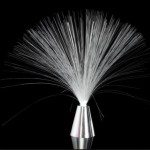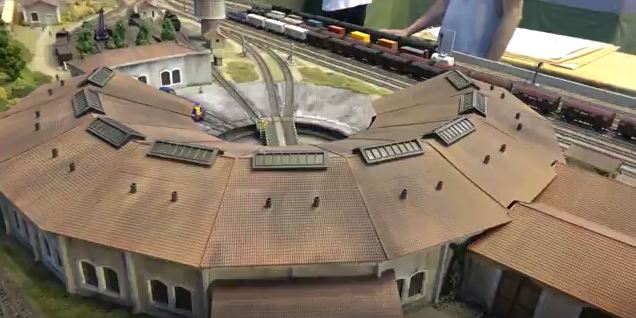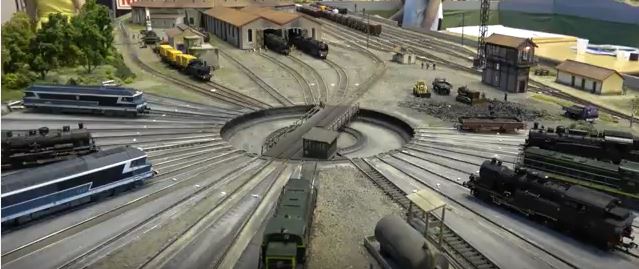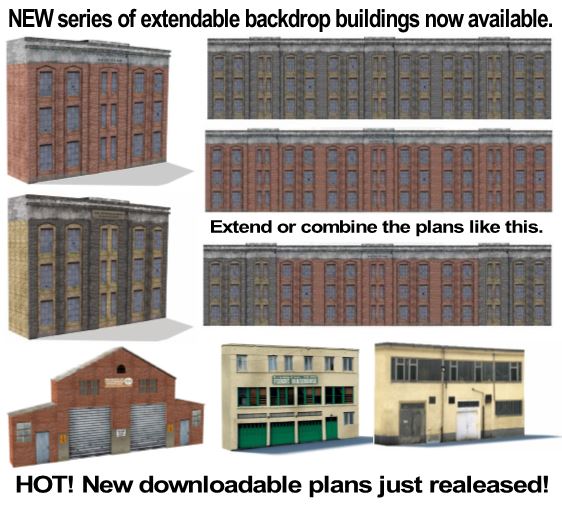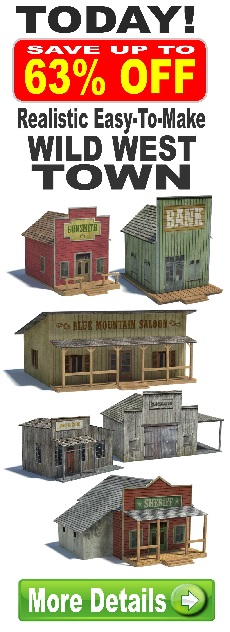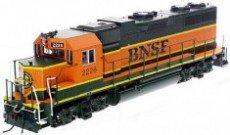Everything on model trains, model railroads, model railways, locomotives, model train layouts, scenery, wiring, DCC and more. Enjoy the world's best hobby... model railroading!
Turnout Switching Compatibility
Ed who models N scale asks readers this question:
“I know I can connect my Atlas code 80 track to my Kato Unitrack. I’m running my mainline with Kato and going to Atlas for an inner loop and yard. My question is in regards to turnouts. If I have a Kato turnout connected to an Atlas turnout, Can I somehow connect both to a single Kato (or Atlas) switch so that a single switch will control both turnouts?”
Planning Super Elevated Curves
Ross M sent in this question for readers:
“I am planning an HO layout with super elevated curves of 28 inches to 30 inches in radius I think. My question is how much higher would the outer rail be than the inner rail?”
If you would like to have your question on this blog (10,000 readers weekly), use the ‘Ask A Question’ link below each posting.
Quartering a Locomotive – What is it?
Jim C posted this question:
“I overheard someone at the train show taking about “quartering the wheels of a locomotive”, but didn’t get the chance to find out what he meant. I’m just curious on what quartering is, how is it done, and if its worthwhile? From what I overheard, I gather it has something to do stopping a loco from swaying back and forth, but I’m not sure?”
Add your comments below.
How to Model a Decorative Fountain for My Layout
Pam sent in this question for readers:
“Our new HO layout will have a small park with seating, ornamental trees and shrubs, and a flower garden. I’m in charge of the scenery, and Bill my hubby, is the boss of all the tricky electrical stuff. Just as well because I have no idea on anything technical. Anyway, I thought it might be nice to add a feature water fountain (not real water) in the middle of a small pond in the park. Has anyone made a decorative fountain that looks like it’s spouting water? I remember those fiber lights that were popular a few years back and wondered it they might work? I was also wondering what to use for the concrete fountain itself? Any ideas please.”
Switch Wiring Problems
John model O scale and asks readers:
“My problem is that SW2 switches as if it didn’t have external power, and it does, as the train passes over. If I remove the connecting track to the switch from the saw mill loop there is no problem. That solution doesn’t allow a return from the spur to the main line. What am I doing wrong?”
John, you can attach a schematic if you think it helps. Just add a comment under your post and attach the schematic there.
Fixing Turnout Switch Failures
Ed who models HO scale asks readers:
“I am having problems with the switches pressed to actuate a turnout. I’m finding them staying stuck in the depressed condition causing the turnout motor to melt. Does anyone else see this problem. Its happened to me enough times to get expensive.”
Can I Join Two Track Brands Together?
Kevin asks readers this:
“Gday. I’ve saved 2 HO scale starter sets to my eBay but are made by different makers. Will, or can I, join the two track brands together? That is if I keep buying different starter sets can I add them to make a bigger layout or should I stick to one manufacturer? All will be HO scale . Thanks“
Problem Poly Gear and Axles on Bachmann Engine
HO enthusiast Greg asks readers:
“I have a Bachmann 2 6 0 consolidation with bad poly gear and axles. I can’t locate any repair parts with out buying the whole drive system. Are there any upgrades or replacement parts from any other companies? Thanks.”
Converting To Knuckle Couplers – Worth The Effort?
Pete G who is into OO gauge asks:
“Swapping over to knuckle couplers is a big task so I’ve been told. Are they as good as they are made out to be and should I bother?”
Use the COMMENTS link below to add your answer of make a comment to assist Pete.
If you want to submit a question to the Blog Moderator for possible inclusion on the blog (read by 10,000 readers weekly) use the ASK A QUESTION link under this post. Approved questions get posted usually within 12 to 72 hours.
NEW! Extendable, Adaptable Plans For Photo Realistic Scale Model Backdrop Buildings Now Available
Here’s an easy way to effectively extend the background scene behind a rail yard without spending a fortune on plastic models. The two red and gray brick buildings seen below can be constructed to resemble the images on the left, or you can extend the width of the buildings by just printing out another copy of the full color plans. You won’t need to download the plans a second time… you just print out a second or third copy to extend the building out as far as you want. The designs can even be combined to use a mix of red and gray brickwork (as seen in the third image below).
Foamboard or corflute is the best construction material as it is cheap to buy in large sheets, and is very sturdy. Otherwise you could use card from an old cereal box (maybe double the thickness). Thin strips of balsa or even plastic power ties can be painted gray to add extra detailing if required. They look very authentic when constructed.
Downloadable plans for the buildings in this new series can be purchased separately, or if you want to save some money, combination packs of several buildings are currently available on the website at a discounted price. Full details here http://www.modelbuildings.org/Pack-K-Industries-Backdrop-Structures.html
Back In The Hobby After 27 Years
Jack asks readers:
“I gave up model railroading around 27 years ago when we moved to a smaller house, but I kept 3 locos packed in boxes. We have relocated to my son’s property on a farm and he has a big shed where I can set up my trains again. I tested the engines but they are running sluggishly and one only goes intermittently. They used to perform well but that was a long time ago. What do I need to do to clean and lubricate them?”
Fixing an Electrical Problem in a Locomotive
Craig sent in this question for readers:
“My LGB 251902-3 (2051S Cat#) will not pick up electricity from the rail. My smaller Furka Oberalp works just fine on the track. I have found that when I test the pick up plates, there is no circuit between the plates, meaning there is no voltage to the motors. It was working fine until just recently, but has been sitting on a shelf in my workshop for about 3 weeks.Any suggestions?”
Is the Passenger Vehicle in this Video a Bus, a Tram, or a Train Without Rails?
When I first visited China back in the 1980’s the cities were over-run by bicycles – there where millions! These days bikes are a reasonably rare sight in most major cities. Motorbikes and buses are becoming less common too. This is because cheap, efficient, safe, environmentally friendly alternatives are now available.
China now has the biggest network of high speed bullet trains in the world, as well as extensive underground metro mass transit systems under most of its major cities. As an example by late 2020, Shanghai will have around 502 miles (808 km) of subway lines servicing 500 plus stations… and that’s just one city! The metro stations are spotlessly clean with marble tiles etc, and trains run every 3 to 4 minutes in most cases.
Above ground, traditional polluting diesel buses will become even more of a rarity when these new transit vehicles that run on “virtual sensor guided track” become widespread throughout China. Some people say its a type of train on a guided track, and others would claim its are a type of bus, or tram.
What’s your opinion? Remember there are no rails in the traditional sense, but it still needs a track of “almost invisible” sensors for it to run on, so it can’t leave the line of track like a bus could. It also has no Catenary or Pantographs; so in your opinion is it a bus, train, tram, or a hybrid with no name? Add your thoughts below.
The 32 meters long and 3.4 meters high people mover, can carry 307 passengers with a top speed of 70 kph.
Instead of track, this passenger vehicle runs along dotted lines on the ground, controlled by hundreds of sensors. It also use rubber tires, which makes the journey like riding the bus. It uses Lithium Titanate batteries enabling it to run 25 km after just 10 minutes of charging.






